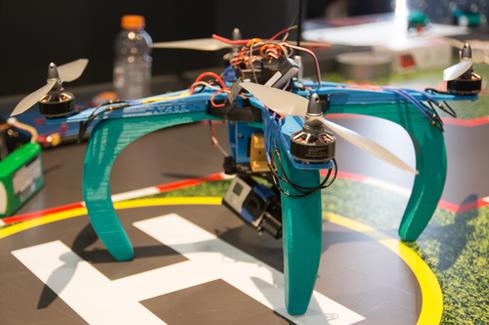Microsoft's Garage Project team has cooked up a new alarm clock app that forces users to make faces or play games to turn it off. What's most interesting about Mimicker Alarm is not what it makes people do, but how it uses artificial intelligence to determine the actions.


8 Cool New Drones Taking Flight
8 Cool New Drones Taking Flight (Click image for larger view and slideshow.)
There's no snoozing allowed for users of the Mimicker Alarm, the latest effort from the sadists in Microsoft's Garage Project.
Microsoft's new alarm clock app for Android devices goes the extra mile to make sure you're awake. Rather than rely on a switch to turn it off, it can only be silenced if the user plays a simple game that Microsoft calls a Mimic. The game is powered by artificial intelligence.
Like any alarm, the Mimicker Alarm lets users choose the exact time they want to be awakened. It supports daily and one-time alarms, and includes a number of alert sounds and tones.
That's where the similarities end. Few alarms work the way Mimicker does.
"To dismiss your alarm, you must mimic the action given. We might ask you to snap a selfie, speak a phrase, or even get out of bed," said Microsoft. The actions include matching expressions, capturing colors, and completing tongue twisters.
"The Mimics require you to be alert, smart, and use you and your surroundings, so be ready to move." Moving is typically the last thing sleepers wish to do early in the morning. What's worse, the response is timed. Mimicker assumes users who don't complete the game quickly enough have fallen back asleep, so the alarm will go off again.
[AI can be used for good, and not evil: 6 Machine Learning, AI Analytics Trends to Watch.]
To complete the horror show, Mimicker will let users share their results with friends. This way, everyone can get a glimpse of that nasty case of bed-head. Microsoft apparently wants everyone to share the worst versions of themselves for a good laugh.
You can see it for yourself here:
What's most interesting about Mimicker Alarm is not what it makes people do, but how it goes about determining the actions. Microsoft's team built the app using Microsoft Project Oxford, which is a platform of artificial intelligence APIs. For example, the Emotion API powers the Express Yourself game (mimic emotions), and the Speech API determines if users get the tongue twister right. The Computer Vision API analyzes colors in the color-capture Mimic game.
Moreover, any images, sounds, or video generated and shared by users is uploaded to the Project Oxford APIs to help bolster their functionality. Microsoft says that the uploaded data is anonymized and that the company will not use it to identify or contact users. The code for Mimicker Alarm is available via GitHub. There, interested parties can view the source, file issues, and contribute Mimics, if they desire to.
Microsoft's Mimicker Alarm is free to download from the Google Play Store.
Will you give this app a try? Do you know someone who could benefit from this kind of wake-up torture? Or do you consider this a violation of the Geneva Convention? Tell us what you think in the comments section below.
About the Author(s)
You May Also Like







